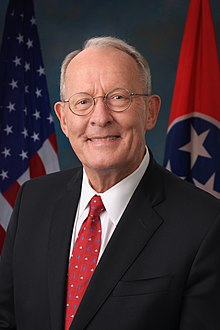
WASHINGTON—With the number of confirmed coronavirus cases in the U.S. nearing 1,200 on Mar. 11, Sen. Lamar Alexander (R-Tenn.) stalled an attempt to expedite a bill that would require employers to give workers 14 days of paid sick leave in case of a public-health emergency.
Alexander, chair of the Health, Education, Labor, and Pensions Committee, blocked a procedural move by Healthy Families Act sponsor Sen. Patty Murray (D-Wash.) to bring the bill to the Senate floor without a hearing by his committee.
“It’s not a cure for the coronavirus to put a big new expensive federal mandate on employers who are struggling in the middle of this matter,” Alexander said during debate. He argued that if the federal government was going to require paid sick leave, it should pay employers to provide it.
The bill’s 14-day mandate matched the 14-day period that the federal Centers for Disease Control recommends that people “self-quarantine” if they have symptoms of infection by the COVID-19 coronavirus. The number of confirmed cases in the U.S. has increased roughly fifteenfold in the past 10 days, with 31 deaths reported. The United Nations World Health Organization officially declared the disease a pandemic Mar. 11, with more than 118,000 confirmed cases and more than 4,000 deaths worldwide.
“In the face of the COVID-19 pandemic, it is unconscionable that Senate Republicans have blocked an emergency paid-sick-leave bill from coming to the Senate floor,” Eileen Appelbaum, codirector of the Washington-based Center for Economic and Policy Research, said in a statement. “Refusing to allow it to get a hearing on the Senate floor shows a callous disregard for the well-being of Americans.”
The AFL-CIO urged Congress to pass the bill as part of a bigger package of measures to protect workers. “Workers who are sick, or who are affected by quarantine orders, must receive paid sick leave,” federation government-affairs director William Samuel wrote in a letter to House members earlier in the day. “The COVID-19 virus has highlighted the inadequacy of our system of paid sick leave, workers’ compensation, and unemployment insurance, which must now be modernized and improved to address the crisis.”
The letter also called for legislation to require the Occupational Safety and Health Administration to issue an emergency temporary standard to protect health-care workers; making testing for the virus free; giving unemployment benefits to workers who lose their jobs because of the disease’s economic impact; providing aid to state and local governments to mitigate that impact; and expanding nutritional-aid programs such as food stamps, school lunches, and the Women, Infants, and Children program.
It called President Donald Trump’s proposal for cutting the Social Security payroll tax “a stealth attack on Social Security” that wouldn’t help laid-off workers, and said any response should not scapegoat immigrants, because “the virus will not discriminate in who it makes sick.”
Republicans object that paid sick leave would cost employers too much. “Job creators do not need additional Washington-knows-best, federal mandates weighing them down,” Rep. Bradley Byrne (R-Ala.) said at a House Subcommittee on Workforce Protections hearing, citing National Federation of Independent Business claims that its requirements—in normal times, workers would be able to earn up to seven paid sick days off, at the rate of one day for every 240 hours worked—could cost 43,000 jobs a year. He called for “flexible and personalized solutions” such as the 2017 tax-cut law’s tax credits for employers who give workers at least two weeks of paid family and medical leave, and the longstanding Republican proposal to let private-sector employers offer workers paid time off instead of time-and-a-half pay for overtime.
Byrne also accused Democrats of politicizing the issue. “The vast majority of employers are already responding to their employees’ needs,” he said. “According to the Bureau of Labor Statistics, 73% of all private-industry workers and 83% of full-time workers have access to paid sick leave,” including 73% of full-time workers at small businesses, according to the NFIB.
That paid time off, however, is not evenly distributed around the workforce. According to the Center for Economic and Policy Research, 93% of the highest-paid workers have access to paid sick days, but only 30% of the lowest-paid do.
“Many workers in jobs with the greatest exposure to the public are among those least likely to have access to paid sick days,” Appelbaum said. “Workers in jobs ranging from aides in nursing homes to retail clerks to child-care workers are unlikely to be able to afford to lose a week’s pay and may be unable to take time off from work.”



